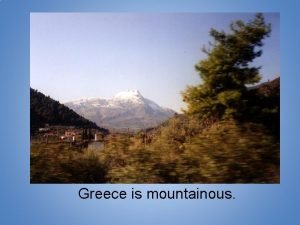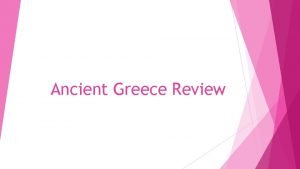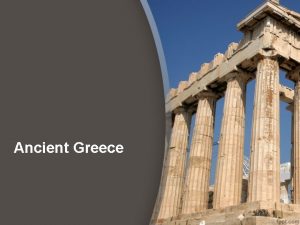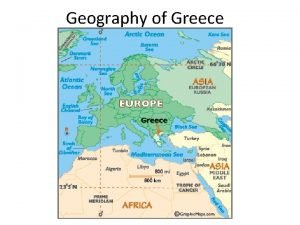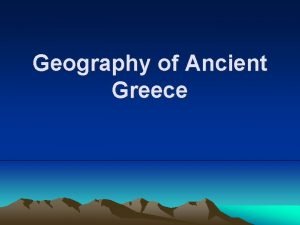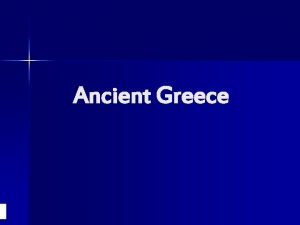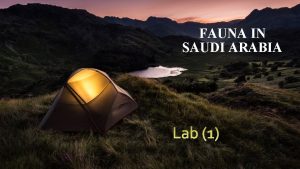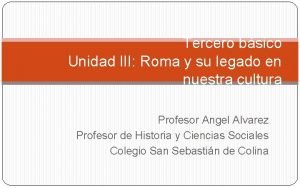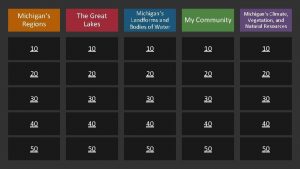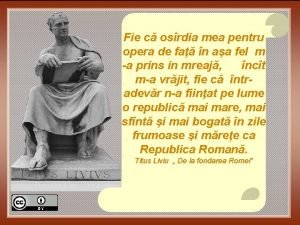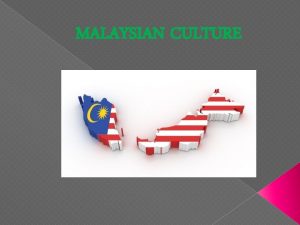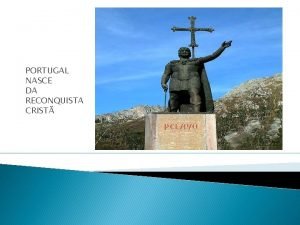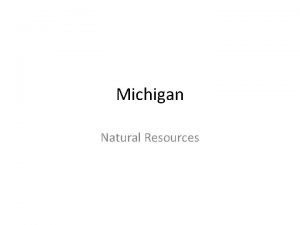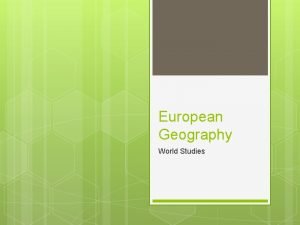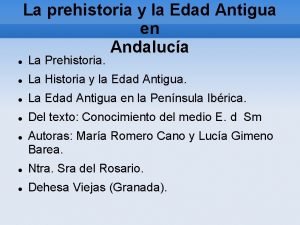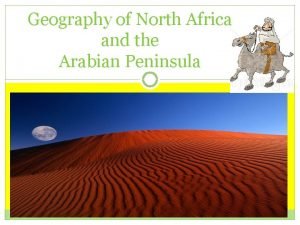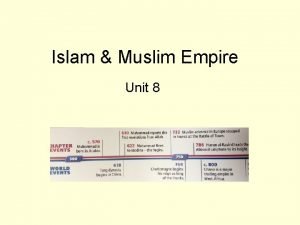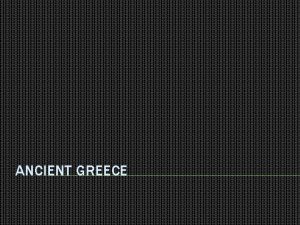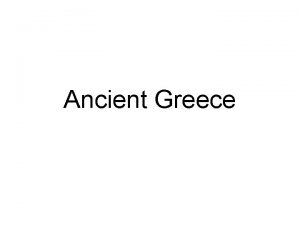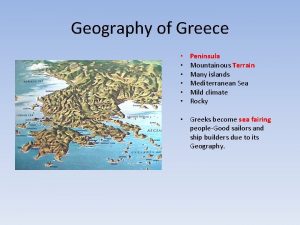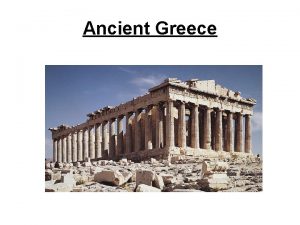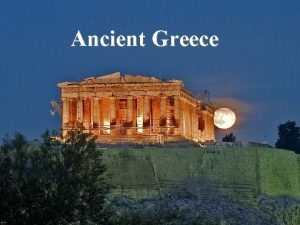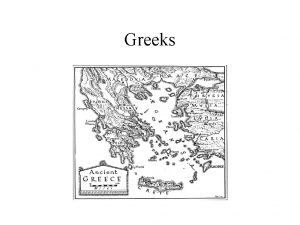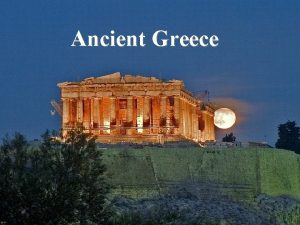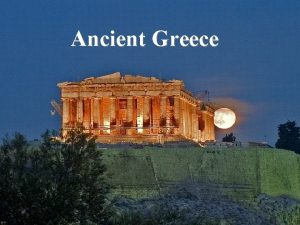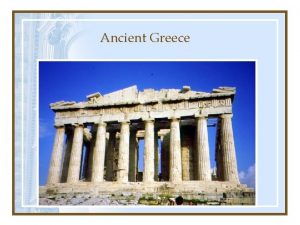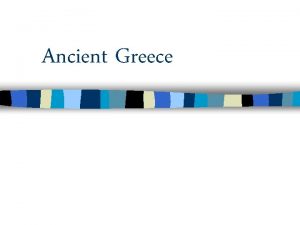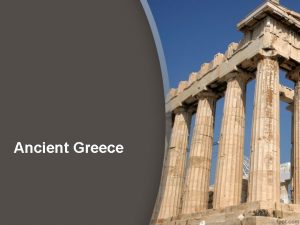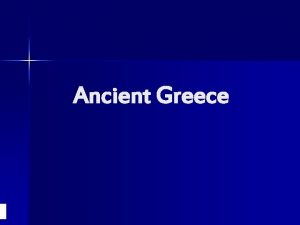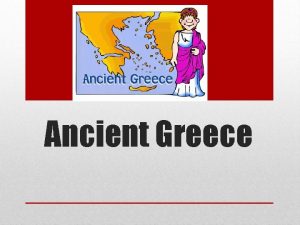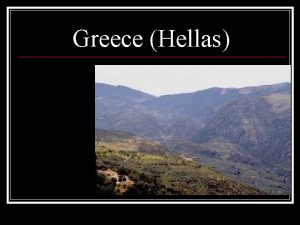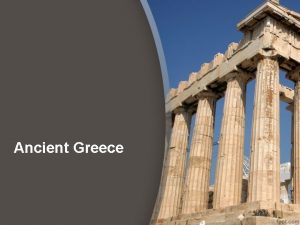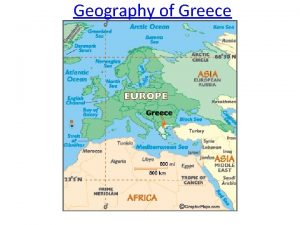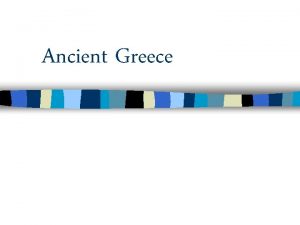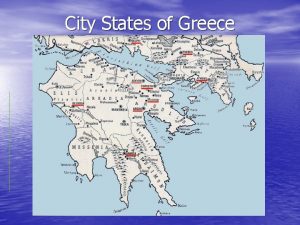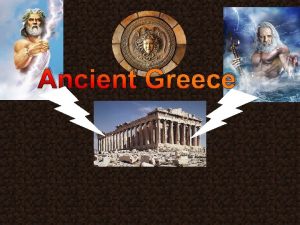Greece is mountainous Greece is a mountainous peninsula


























- Slides: 26

Greece is mountainous.

Greece is a mountainous peninsula with islands.

The Geography of Greece • Ancient Greece consisted of a large mountainous peninsula and islands in the Aegean Sea. • Its hilly terrain made farming difficult • Its location encouraged trade.

Mountains separated Greek cities.

The Effects of Mountains • Greece’s mountainous terrain separated the ancient Greek cities. • As such, the ancient Greeks never developed a unified system of government. • The ancient Greeks developed the polis or city-state.

The Greeks lived in separate city-states.

The Polis • Polis was the Greek word for “city-state”. • A polis was an independent city and its surrounding farmland. • Every polis had its own government and laws but the Greeks shared a common language and religion.

The ancient Greeks farmed but it was difficult. Hills are not suited for farming.

However, there is always the sea.

Even today, the Greeks have access to the Mediterranean Sea and the Aegean Sea.

The Seas • Greece is a peninsula and islands. • Seas surround parts of Greece. • The Seas allowed the Greeks to travel and trade. • Trade encouraged cultural diffusion.

Trade and Cultural Diffusion • The seas allowed the Greeks to depend heavily on trade. • Trade encouraged cultural diffusion. • The Greeks were exposed to the Phoenician alphabet and Egyptian geometry.

Questions for Reflection: • Why was it difficult to farm in ancient Greece? • Why did the Greeks depend heavily on trade? • List two geographic features and their effects on the Greeks. • Why did the ancient Greeks never develop a unified system of government? • Define polis.

It is important to remember that mountains separated the Greek city-states.

The Polis • The hilly terrain separated the Greeks. Though the Greeks shared a common language and religion, they never developed a unified system of government. • The Greeks lived in separate, independent city-states. • The Greek word for a “city-state” was a polis.

This magnificent building is the Parthenon. The Parthenon was a temple in Athens, a Greek polis.

Athens • Athens was an important polis in ancient Greece. • The people of Athens developed democracy. • Democracy is a system of government where citizens vote or participate in government.

In Athenian democracy, only free men born in Athens could vote. Women, slaves, and foreigners could not vote.

This is a painting of the famous Athenian philosopher, Socrates. He encouraged his followers to ask questions.

The Golden Age of Athens • Athens experienced a golden age. • A golden age is a time of peace, prosperity, and great achievements. • The Athenians produced great works of literature, philosophy, and art.

Sparta was another important Greek polis.

Sparta • Sparta was a militaristic polis. • In Sparta, all men had to serve in the military. • Weak or disabled babies were left to die.

A Spartan’s life revolved around the military. A Spartan man was a soldier for most of his life.

Helots • The Spartans had helots or slaves. • The helots farmed for the Spartans. • While the helots farmed, the Spartans focused on military affairs. • Life in Sparta differed greatly from life in Athens.

The Spartans had enslaved the helots.

Questions for Reflection: • What was a polis and why did the Greeks develop the polis? • Define a golden age and name a Greek polis that experienced a golden age. • List three differences between the ancient Greek polis of Athens and Sparta. • Who were the helots and how were they treated? • Describe Athenian democracy.
 What 4 seas surround the balkan peninsula
What 4 seas surround the balkan peninsula The rise of greek civilization *
The rise of greek civilization * Balkan peninsula in ancient greece
Balkan peninsula in ancient greece Ancient greece map balkan peninsula
Ancient greece map balkan peninsula Why did tyrants fall out of favor
Why did tyrants fall out of favor Sparta greece map
Sparta greece map Ancient greece peninsula
Ancient greece peninsula Balkan peninsula in ancient greece
Balkan peninsula in ancient greece Fauna of saudi arabia
Fauna of saudi arabia Península itálica
Península itálica Michigan landforms
Michigan landforms Peninsula unde era situată roma
Peninsula unde era situată roma Kruger telegram
Kruger telegram Monterey peninsula water management district
Monterey peninsula water management district Qatar politica
Qatar politica Saréea
Saréea Fases da reconquista
Fases da reconquista What is michigan's natural resources
What is michigan's natural resources Península italica
Península italica Yamal peninsula weather
Yamal peninsula weather Where is the scandinavian peninsula located
Where is the scandinavian peninsula located Primeros pobladores peninsula iberica
Primeros pobladores peninsula iberica Peninsula gospel partnership
Peninsula gospel partnership Arabian peninsula
Arabian peninsula Peninsula
Peninsula Arabian peninsula
Arabian peninsula Is wales a peninsula
Is wales a peninsula
